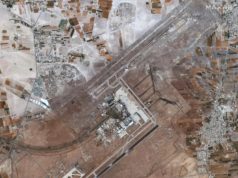In August, President Obama finally called for Syria‘s leader, Bashar al-Assad, to “step aside”. Yet, the White House has yet to adopt a strategy that would hasten the fall of the despotic regime in Damascus. The goal of US policy should be an end to the violence that has claimed more than 3,000 Syrian lives, by working toward the fall of the Assad regime. At the same time, the US should endeavor to create the conditions for a stable democratic system in Syria that protects the rights of all minorities. US strategy must aim to weaken those who support the regime within and outside of Syria, while encouraging the opposition to demonstrate its goal of a nonsectarian and democratic Syria.
But with Americans and the international community weary of another military intervention after the Libyan bombing campaign, the question remains, could Washington achieve such a goal nonviolently? The answer is yes.
The first step is for the White House to change its rhetoric. The Obama administration must pull back from its current inexplicable strategy of basing US support for the Syrian opposition on the extent to which it remains nonviolent. While the White House pledges to remain on the sidelines, as a matter of policy it is self-defeating and cynical to demand that the protesters eschew violence while activists are routinely slaughtered by regime thugs. And it sounds disingenuous when the US ambassador to Syria, Robert Ford, proclaims that the Syrian opposition should “not look to outsiders to try and solve the problem”, given that Libya was so quickly deemed an international problem.
It is time for the Obama administration to reverse course and begin ruling options in, rather than ruling options out.
This is not to say that the US should encourage violence from the opposition forces. But American policy should not stand in the way of the protesters defending themselves; nor should it discourage other countries or entities from assisting protesters. Rather, the US should encourage mass defections of Syrian soldiers and officers. As long as Washington’s goal is to remove Assad from power, America will continue to have an interest in protecting the opposition. Therefore, official US rhetoric on Syrian citizens defending themselves must change today.
More concretely, the US could pressure the Alawite generals – who hail from the same minority sect as Assad – to step away from the regime. As an incentive, they should be promised a future for their communities in a post-Assad Syria, in exchange for their refusal to follow orders and kill their fellow citizens. Although the US lacks military contacts with Syrian generals, Turkey, Jordan and France could be particularly useful in this effort.
The US should also work with the EU to strangle Syria’s economy. The EU has made a step in that direction recently by banning the import of Syrian oil and cutting off any new investment in Syria’s energy sector. The ban is set to go into effect on 15 November. The speed with which the EU moves to ban all trade with Damascus will certainly cause a strain on the elites in Syria’s business community and further undermine the Assad regime.
Inside Syria, the US and its allies should actively provide assistance to Syrian opposition groups. This would include providing financial aid to striking Syrian workers and portable communications equipment that is encryption-enabled to help organise the protest movement. A cross-border wireless internet zone that reaches just 20 miles from Syria’s borders would be a significant boost for opposition groups. The White House should also work with allies and humanitarian workers, such as the Red Cross or Red Crescent, to set up protection zones that are weapons-free safe areas for fleeing refugees along Syria’s borders.
With NATO calling off military operations in Libya, action in Syria will require that the United States assume a leadership role. This is not a case for unilateral US steps, but rather for the effective use or combination of all policy options that are on the table. The stakes for the US and the Middle East are high. But the White House has options short of military intervention and it requires that the US take the lead. Without American leadership, a commitment to that goal, and a specific strategy to get there, important segments of Syrian society will remain on the fence, unwilling to wholly break from the regime and test the limits of its wrath.
It is not enough to call for Assad to “step aside”, and then wait to see what happens.





